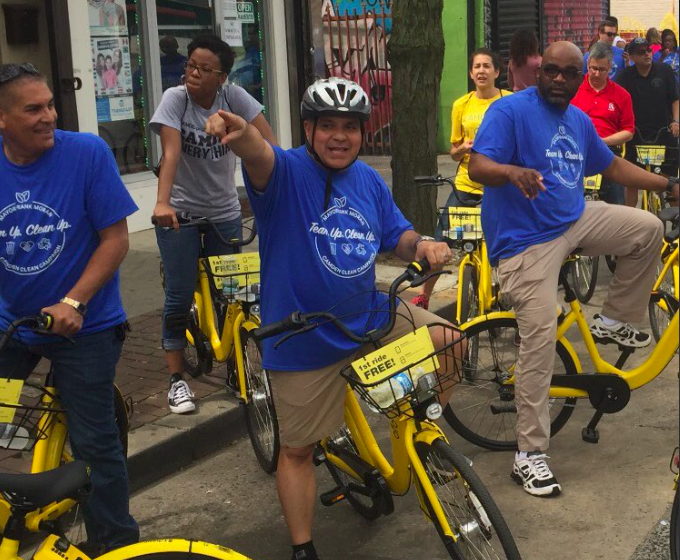The future looked bright when Camden, New Jersey, launched a dockless bike-share pilot with the Chinese firm ofo in May, but the program didn't last long, with ofo scaling back its operations in North America and pulling out of the city last week.
The hope was that ofo's 200 bikes would expand access to cycling in a low-income city that lacked station-based bike-share. In retrospect, writes Lark Lo at Black Kids in Outer Space, the company's decision "to purposely go to economically oppressed, Black & Latinx communities" appears to be a cynical attempt to burnish its image. Whatever ofo's goal was, it didn't work out.
The Cooper's Ferry Partnership, which sponsored the Camden pilot, says data gathered from the two months of ofo operations will inform a feasibility study for future bike-share programs in the city, although the "demonstration portion" is over.
John Boyle at the Bicycle Coalition of Greater Philadelphia reports that the city's experience with ofo turned sour long before its withdrawal:
For one week, ofo bicycles were everywhere in the City. The week was capped off when Mayor Moran led a celebratory bike ride on Friday, May 4th.
But by the end of that weekend, the bikes were difficult to find.
You could see plenty of them available on the ofo app, but often when you went to a location: nothing. We received reports of bikes in the back of pickup trucks and being taken on the RiverLINE train to points beyond the City.
We saw bikes with the rear fender torn off (where the lock and GPS sensors are located).
For reasons unknown to us, Camden County Police were impounding some of the bikes.
When ofo officials were asked about the deficit of bikes at a meeting, they cited people not relocking the bikes after they rented them. In that meeting, ofo also promised that 300 more bicycles were on the way.
We are only able to report on what we saw because ofo would not publicly disclose usage or losses of bicycles. What we were able to do was track the availability of bikes, but even that was a challenge.
Unlike Indego, where you can see the availability of every bicycle station, the ofo app only shows you what is nearby. So we relied on the ubiquitous TransitApp which scraped the ofo bike location data and put it nicely on their map. We spot checked locations on the ofo to verify that the information was current.
What we found is that only a tiny percentage of the 200 bikes were available for use. On May 9th, we located only 26 available bikes on the app. One month later, on June 10, only seven total bikes appeared on the TransitApp map. ofo deployed a few dozen additional bikes on the street in mid-June.
Within days, most of those disappeared, too.
Not all bike-share companies are as unreliable as ofo, which has a reputation for poor equipment and exploitative labor practices. And as Seattle's Pronto demonstrated, station-based bike-share can be mismanaged into oblivion too. But what happened in Camden highlights a major risk when cities work with bike-share companies that reveal so little about their operations and finances. You never know how long it's going to last.






